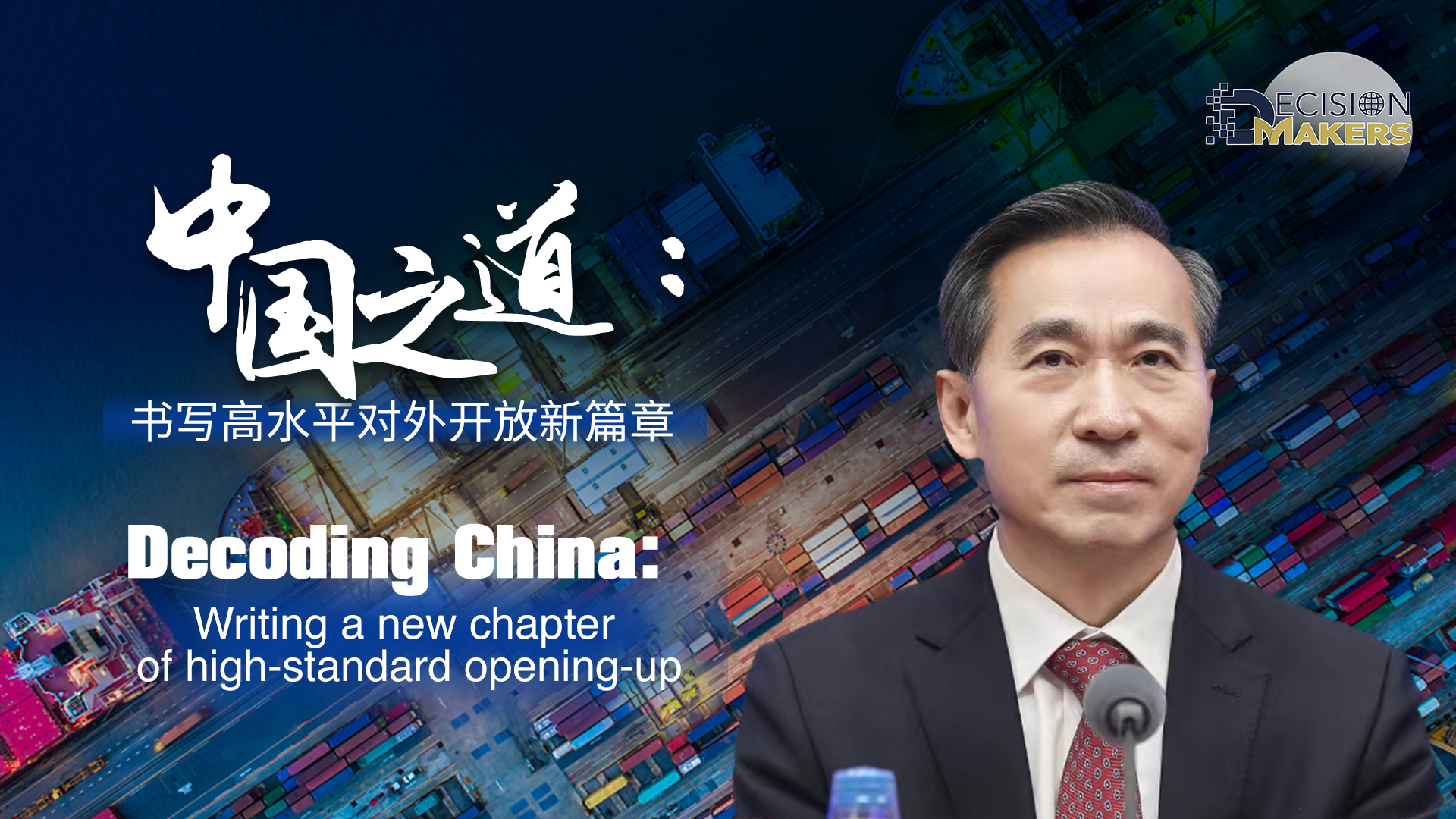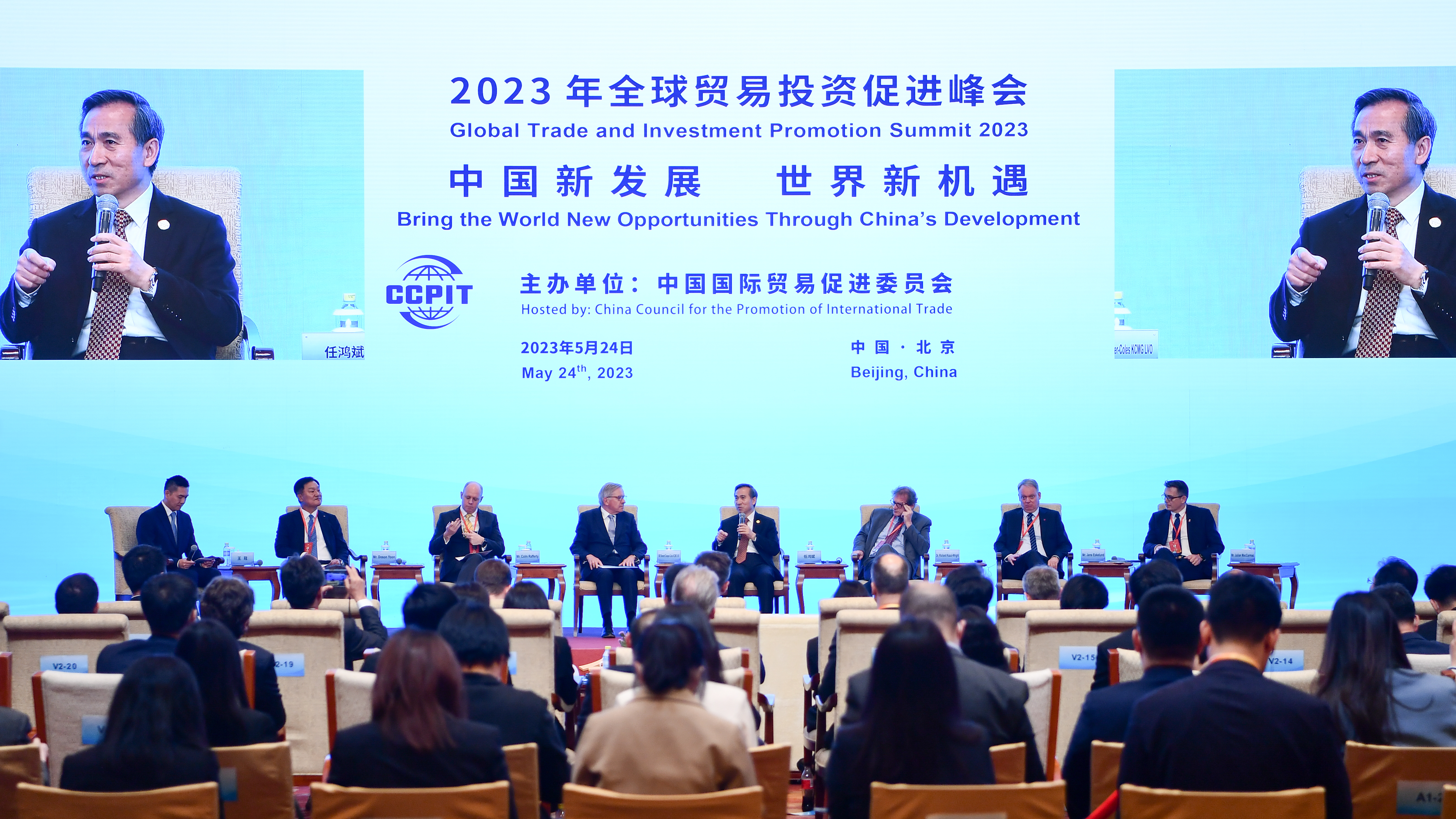
Editor's note: Xi Jinping Thought on Socialism with Chinese Characteristics for a New Era is China-centered, and internationally applicable; it caters to the present and is geared towards the future. In CGTN's Decoding China series, domestic and international high-profile officials and experts from various fields share their experiences and talk about Chinese governance and its global implication. In the fifth installment, Ren Hongbin, Chairman of the China Council for the Promotion of International Trade (CCPIT), elaborates on how the CCPIT further promotes China's high-standard opening-up through various policy measures.
Opening-up is the hallmark of contemporary China. Since the beginning of this year, Chinese President Xi Jinping has emphasized the imperative of proactively elevating China's opening-up to a new level, asserting that "only an open China can become a modern China." The China Council for the Promotion of International Trade (CCPIT) has been playing a pivotal role in enhancing ties between Chinese and foreign businesses, promoting international trade and economic exchanges, and bolstering inter-state relations. Its efforts contribute to fostering a new system for a more advanced open economy and propelling high-quality economic development.
Strengthening foreign trade and investment
President Xi Jinping, in his report at the 20th CPC National Congress, stressed the need to "accelerate China's transformation into a trader of quality" and "foster a world-class business environment that is market-oriented, law-based, and internationalized." In the face of global economic challenges and sluggish cross-border investment, China has rolled out a series of policy measures to ensure steady foreign trade and investment growth. Importantly, these policies have yielded stable results, with a notable influx of multinational corporations into China and a surge in foreign-funded enterprises. In the first seven months of this year, China's import and export grew by 0.4 percent year-on-year, which was stable and in line with expectations. Executives of multinational corporations have been flocking to China. The number of newly established foreign-funded enterprises increased by 35.7 percent year-on-year in the first half of the year. Quality foreign investment in high-tech sectors increased by 3.9 percentage points to 39.4 percent. These trends affirm China's status as a preferred destination for cross-border investment.
The CCPIT has been fulfilling its fundamental role of serving companies and is relentless in promoting trade and investment. It organized the first China International Supply Chain Expo and held overseas roadshows in 30 countries and regions to ensure the smooth flow of goods in global industrial and supply chains. Over 300 companies signed agreements to join the expo, with international exhibitors accounting for more than 20 percent. The CCPIT also hosted the 2023 Global Trade and Investment Promotion Summit, bringing together political and business representatives from more than 30 countries and regions, and fostering cooperation among the global business community. It has been instrumental in promoting free trade agreements, issuing more RCEP certificates of origin, and facilitating trade and investment cooperation through delegations and foreign investment promotion services. The number of RCEP certificates of origin issued from January to July increased by 61.26 percent year-on-year.
The focus of its task force serving foreign-invested enterprises has shifted to in-depth research, improving the business environment, and assisting local governments in attracting investment. This year, the task force has collected 1,598 demands from foreign-funded enterprises, and have addressed or actively responded to 1,260 of them. Since its establishment in May last year, the task force has collected a total of 7,608 demands, addressing or actively responding to 5,864 of them. The CCPIT has met with business leaders of over 70 Fortune 500 foreign companies, and offered support to large-scale investment promotion events in many places. The CCPIT also organized hundreds of key foreign-funded enterprises to visit Sichuan, Tianjin, Jiangsu, and other places for research and negotiation, resulting in a number of significant foreign investment projects being finalized.
Promoting high-quality development of the Belt and Road Initiative
The Belt and Road Initiative (BRI), introduced by President Xi during his visit to Central Asia and Southeast Asia in 2013, has witnessed substantial achievements. China has signed over 200 cooperation agreements with 152 countries and 32 international organizations. Many landmark projects have materialized. The Belt and Road Initiative has emerged as a highly acclaimed international public good and a platform for international cooperation. From January to July this year, China's import and export with BRI partner countries increased by 7.4percent year-on-year; China's non-financial direct investment in these countries grew by 23.2 percent year-on-year; and the number of China-European Union (CEU) trains and the volume of goods sent increased by 13 percent and 27 percent respectively. The China-Laos Railway has been operating safely and stably. Projects such as the Jakarta-Bandung High-Speed Rail and the Hungary-Serbia Railway are making steady progress. The nexus of interests of the countries participating in the Belt and Road Initiative keeps expanding.
The CCPIT adheres to the principle of achieving shared growth through discussion and collaboration. It has established 393 bilateral and multilateral business cooperation mechanisms, including the Silk Road Business Council, with its counterparts in related countries, to tell the story of building the Belt and Road and push forward economic and trade cooperation under the initiative. The inaugural meeting of the China-Central Asia Business Council held by the CCPIT during the China-Central Asia Summit signifies a new step in business cooperation under the China-Central Asia cooperation framework. The 10th Arab-China Business Conference and the 8th Investment Seminar of the China-Arab States Cooperation Forum held by the CCPIT in Riyadh of Saudi Arabia saw the participation of over 3,000 representatives from more than 20 countries and related international organizations, making it the largest-ever China-Arab business exchange event.
The First China-Honduras High-Level Entrepreneur Exchange Conference was organized by the CCPIT, during which a memorandum of understanding on cooperation was signed with the Honduran Ministry of Economic Development under the witness of the heads of state of the two countries. The CCPIT was also involved in the reception of the heads of state or government from Uzbekistan, Vietnam, Mongolia, Solomon Islands, Guyana, and Georgia, while organizing satellite forums on economic and trade cooperation during these state visits. The CCPIT led corporate delegations to visit Belt and Road countries like Türkiye, Indonesia, and Malaysia to foster public opinion foundations and strengthen the faith in mutual interests. Meticulous preparations are made by the CCPIT for the Belt and Road CEO Conference, aiming to create more and better outcomes of the third Belt and Road Forum for International Cooperation.

The Global Trade and Investment Promotion Summit 2023, Beijing, China, May 24, 2023. /CCPIT
The Global Trade and Investment Promotion Summit 2023, Beijing, China, May 24, 2023. /CCPIT
Active participation in the global economic governance system
The world is undergoing accelerated changes unseen in a century. The global economic recovery is facing headwinds, and regional conflicts and skirmishes occur frequently, accompanied by notable shifts in the balance of international power. China acknowledges the transformative global changes taking place and actively assumes international responsibilities, advocates and practices genuine multilateralism, and strives to be a builder of world peace, a contributor to global development, and a defender of the international order, with its international influence, its ability to inspire, and power to shape significantly enhanced.
Ten years ago, President Xi raised the creative vision of building a community with a shared future for mankind. He has since proposed the Global Development Initiative, the Global Security Initiative, and the Global Civilization Initiative. In March of this year, he delivered an important keynote speech at the CPC in Dialogue with World Political Parties High-level Meeting, in which he systematically elaborated on the Chinese path towards modernization, expressing a sincere desire to walk the path of modernization hand in hand with other countries and build a community with a shared future for mankind. The Chinese path towards modernization offers more choices for developing countries to modernize and provides a Chinese solution to mankind's exploration of a better social system.
The business community plays a role in the formulation and practice of international economic and trade rules. They are crucial players in promoting the transformation of the global economic governance system. The CCPIT remains committed to keeping an open mind, having a global vision and improving strategic thinking, while taking on the responsibility of representing the Chinese business community in multilateral mechanisms and international organizations.
This year, the CCPIT organized forums such as the BRICS Women's Leadership Forum and the APEC China CEO Forum. It also led a corporate delegation to participate in the B20 Summit in India, and put forward a series of Chinese initiatives which have been widely recognized. The CCPIT recommended 16 Chinese experts to the International Chamber of Commerce, gave advice on 26 ICC rules and conventions, and organized over 40 training sessions and lectures to enhance promotional efforts. The CCPIT constantly enhances its international communication capacity, systematically and comprehensively voicing the opinions of the Chinese business community and telling the story of China's opening-up at its regular press conferences, so that the world can better understand and identify with China.
Moving forward, the CCPIT will better serve as a bridge and an open window, strengthening government-enterprise relations, integrating domestic and international resources, and expanding its network of services for enterprises, and expand its circle of international friends. It will strive for greater achievements in promoting high-quality development, building a new development paradigm, and promoting the development of an open global economy, so as to contribute to building a modern socialist country in all respects and building a community with a shared future for mankind.
(If you want to contribute and have specific expertise, please contact us at opinions@cgtn.com. Follow @thouse_opinions on Twitter to discover the latest commentaries in the CGTN Opinion Section.)